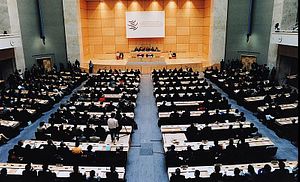The Trump administration’s hard line position on international commerce has paralyzed the World Trade Organization (WTO) since a compromise did not materialize in Geneva this week. The WTO was instituted 25 years ago to prevent protectionism and adjudicate trade violations. However, for the past two years, the United States has played by its own rules by imposing unilateral tariffs and asserting American dominance. This in turn threatens the rules-based international trading order.
The Trump administration has chosen to focus its efforts on U.S.-China trade negotiations, disregarding the existential threat posed to the Appellate Body of the WTO. Traditionally, the Appellate court adjudicates disputes between member states; it is currently composed of just one judge. In normal circumstances, the court has seven judges, but a minimum of three is required for a quorum. The Appellate Body fell to one judge on December 10 since member states did not make new appointments. That in turn has halted all appeal judgements on trade matters until a new solution is reached. In addition, the United States has also threatened to block the Appellate Body’s budget. Currently, Roberto Azevedo, the director-general of the WTO, has stressed that the organization will look for both temporary and long-term solutions during this crisis period.
By refusing possible compromises to save the appeals process, the United States has pushed the organization toward its breaking point. As a compromise was not reached by midnight on December 10, a scenario has arisen where trade violations will go unchecked. This has the potential of creating unruly international commerce “where the strong do what they can and the weak suffer what they must.”
While American officials assert that the WTO is independent of U.S. influence, they have successfully managed to block every nomination to the Appellate court. In July, the deputy United States trade representative argued that “the Appellate Body has felt free to depart from what Members agreed to.” Rather than discussing appellate appointments, the United States has emphasized China’s trade violations, imposing various tariffs in order to force China to back down. However, China has not yielded to U.S. demands. As a consequence, both economies have suffered, and United Nations economists have estimated that the trade war has cost the United States $125 billion dollars and China $35 billion dollars.
Clearly, the WTO needs major structural changes. For starters, one state should not dictate or obstruct the appointment of appellate nominees or its budget. Member states have also complained about the lengthy dispute settlement process. U.S. President Trump’s impatience has simply highlighted existing flaws that have been expressed for decades. However, his approach will not rectify these issues. In addition, Trump has openly disparaged the organization and threatened it based on its treatment of America. In a 2018 interview, he said, “If they don’t shape up, I would withdraw from the WTO.”
This raises the question: is America unfairly treated? Looking at the rate of panel rulings, the WTO has clearly benefited America. However, the United States is single-handedly tearing down the institution by standing in the way of Appellate nominees and setting norms of unilaterally imposing tariffs on major trade partners. The discrepancy is glaring in the current administration’s behavior. When the WTO sides with the United States, the Trump administration takes credit and praises the institution. As was the case in October, the WTO authorized retaliatory tariffs on the EU and at that time Trump jubilantly tweeted the U.S. victory. On the other hand, when China filed an anti-dumping complaint against the United States, the Trump administration completely sidestepped the WTO and preferred bilateral discussions with Beijing, expressing disregard for the institution.
What did the December 10 deadline mean for the future of the WTO? More importantly, what is the United States attempting to achieve by crippling the dispute settlement mechanism? The majority of world trade continues in conformity to the rules of the WTO. However, Trump’s protectionism and China’s predatory policies are posing a systemic risk to the institution. As a major player in the WTO, Washington is destroying an institution it created as a platform for multilateral commerce. The Trump administration is forcing an aggressive agenda through bilateral negotiations where it can disregard the cooperation required in a multilateral forum.
The weakening of the international trading order will result in trade violations, forcing states to protect their own interests. As a result of Trump’s actions, the EU is currently exploring alternative dispute settlement mechanisms. However, such radical measures will create enforcement challenges in the future. The current path forged by Trump will surely cause the WTO to weaken unless a last-minute compromise is achieved in Geneva.
Farah N. Jan is an international relations lecturer at the University of Pennsylvania. Megan Phansalkar is an affiliate of the University of Pennsylvania concentrating on International Relations and Economics.
































